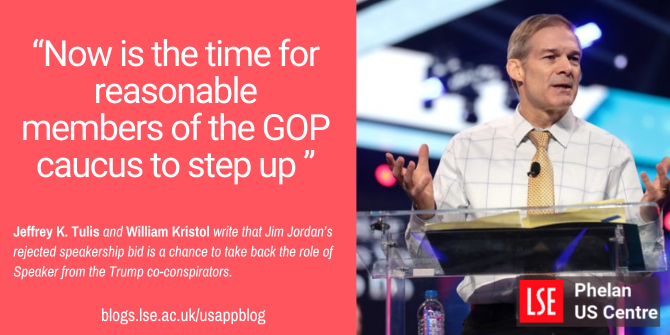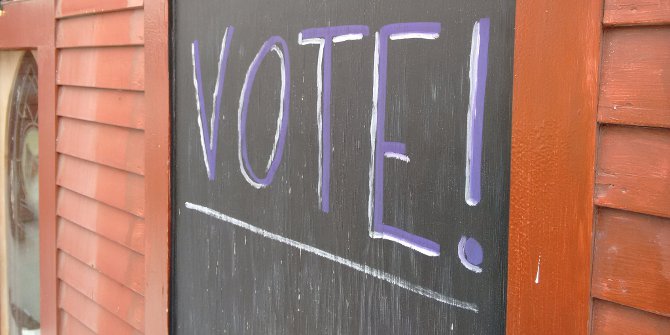
 Last week Republican House Member Jim Jordan tried, and after three ballots of the Republican caucus, failed to become the Speaker of the US House of representatives. Jeffrey K. Tulis and William Kristol write that the Speaker should not be a January 6th co-conspirator with Donald Trump, and examine the bipartisan options for breaking the House from its GOP-caused paralysis.
Last week Republican House Member Jim Jordan tried, and after three ballots of the Republican caucus, failed to become the Speaker of the US House of representatives. Jeffrey K. Tulis and William Kristol write that the Speaker should not be a January 6th co-conspirator with Donald Trump, and examine the bipartisan options for breaking the House from its GOP-caused paralysis.
A member of congress who actively conspired with Donald Trump to undo the results of the 2020 presidential election recently became the Republican nominee for speaker of the House. While he was forced out of the speakership race, what does the fact that he became a candidate at all say about our political moment, and how might better outcomes for our democracy be pursued?
Ten months ago, we asked, “Should An Election Denier Be Speaker of the House?” We urged that the House Republican Conference pick a member who had stood for the Constitution and for common sense on January 6th, and not one who had voted against certifying Electoral College slates from states won by Joe Biden. The GOP conference instead chose Kevin McCarthy (R-CA), who had voted against certifying electors—but who had at least not been central to the election-denial plot, and who had then criticized Donald Trump, albeit briefly, for encouraging the riot that became an insurrection. (Only fifteen days passed between McCarthy saying Trump “bears responsibility” for the “attack on Congress by mob rioters” and his notorious Mar-a-Lago photo op with Trump.)
McCarthy, whose speakership was humiliatingly delayed by opposition from some of the most radical and anti-constitutional members of the GOP conference, was able to retain the support of more moderate members who had voted to certify the election. So, he courted the MAGA extremists while taking for granted the so-called moderates. One result of this exercise of personal ambition was to so normalize anti-constitutional behavior that journalists and commentators today write about the prospect of Jim Jordan being second in line for the presidency as if it were a mere political conundrum for the GOP rather than a profound challenge to the well-being of our democracy and a sign of severe political decay.

“Jim Jordan” (CC BY-SA 2.0) by Gage Skidmore
The institutional vs the partisan responsibilities of the Speaker
The deeper dynamic at play—which we mentioned ten months ago—is the tension between the institutional responsibilities of the speaker of the House and the partisan responsibilities that arise from the practice of the speaker being the leader of the majority party. This longstanding practice is not required by the Constitution—indeed, the Constitution has nothing at all to say about political parties and does not require the speaker even to be a member of the House.
The fact that a significant number of Republicans balked at the prospect of Jordan as speaker is an opportunity to recover a more constitutional, dignified, and unifying conception of the role of speaker of the House.
Recovering the Speakership
Commentators have suggested several ways to do that.
Among the most discussed ideas is some sort of coalition government in which the acting speaker pro tempore—Patrick McHenry (R-NC), who was picked by Kevin McCarthy under a secretive process put in place after 9/11—continues in that role but granted sufficient authority to function as an effective speaker. This arrangement would presumably continue until the next Congress begins in January 2025. In exchange for Democratic votes to make this happen, rules would be changed to ease the procedures for considering legislation on the floor and permitting majority sentiment to be expressed in bipartisan legislation.
Another option is to elect Minority Leader Hakeem Jeffries to the speakership. In this scenario, Republicans who cross over to elect Jeffries would presumably need some guarantees in exchange for their vote—including a promise from the Democrats that they would retain their committee assignments. (The one time in the last seventy years that a representative voted for a speaker candidate of the opposite party, his own party punished him by stripping his committee assignments.) The Republican defectors would also presumably want to make clear that they reserve the right to join their Republican colleagues (or former colleagues if they’re expelled from the GOP conference and are serving as some sort of independents) in opposing Democratic legislation with which they disagree. And a Speaker Jeffries would presumably commit to Republican co-chairmanships of certain committees and perhaps equal membership of the parties on them.
There are other conceivable permutations of this sort of bipartisan arrangement, including the possibility of some other sitting Republican or Democrat elected to serve as a sort of “consensus” speaker, as Joe Straus did for a decade in the Texas House of Representatives. Still another option, recently detailed by Charles Zug, is to elect a bipartisan leader from outside the Congress.
In any case, now is the time for reasonable members of the GOP caucus to step up and make something possible that both averts an awful outcome—a Trump co-conspirator Speaker as Jim Jordan would have been —while showing a path forward for cooperation, bipartisanship, and statesmanship.
Will there be attempts at MAGA reprisal against these Republicans? Count on it. But any fear of such attempts should be weighed against the legacy of complicity with electing as speaker someone not committed to the Constitution or to the peaceful transfer of power. It is not clear what the political consequences of doing the right thing will be. But a certain consequence of doing the right thing would be lifelong knowledge for oneself, and a mark in history for the country, that one rose to the occasion—that at a critical moment, one had the courage and honor to put the nation’s interests first.
- A version of this article first appeared at The Bulwark.
- Please read our comments policy before commenting.
- Note: This article gives the views of the author, and not the position of USAPP – American Politics and Policy, nor the London School of Economics.
- Shortened URL for this post: https://bit.ly/3FNr1Bj





